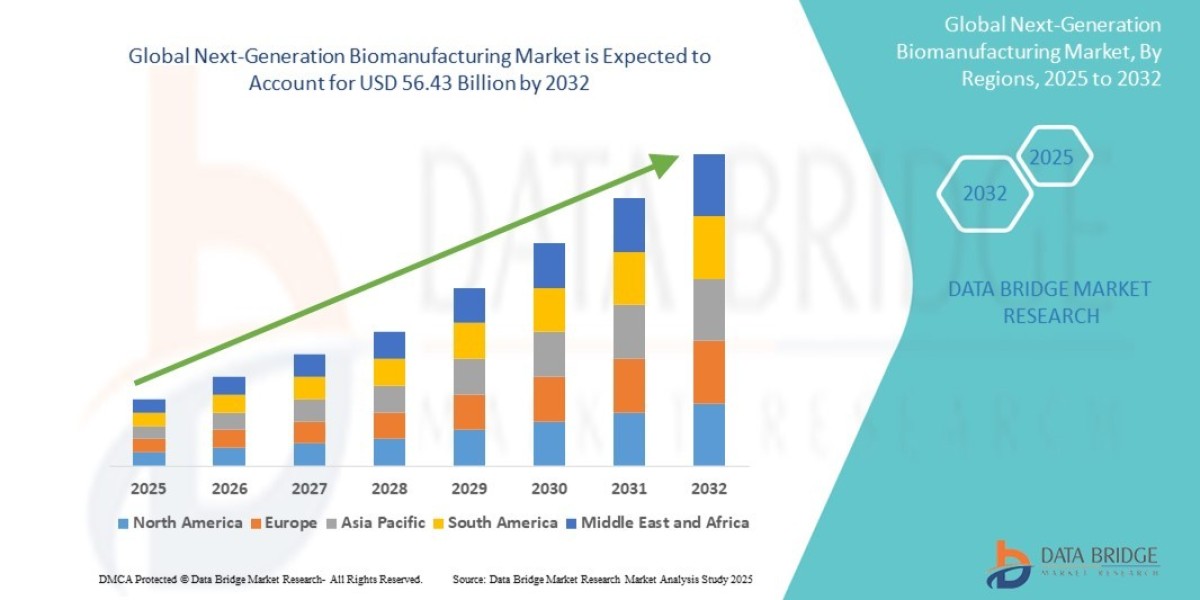"Executive Summary Next-Generation Biomanufacturing Market Size, Share, and Competitive Landscape
CAGR Value
The global next-generation biomanufacturing market size was valued at USD 26.61 billion in 2024 and is expected to reach USD 56.43 billion by 2032, at a CAGR of 9.85% during the forecast period
An exceptional Next-Generation Biomanufacturing Market research document can be formulated well with the blend of top attributes such as highest level of spirit, practical solutions, committed research and analysis, innovation, talent solutions, integrated approaches, most up-to-date technology and dedication. Not to mention, while building this report, all of these attributes are strictly followed. It also aids in taking important decisions for the growth of the business. This market document gives detailed market insights with which visualizing market place clearly become easy. All the data and statistic included in Next-Generation Biomanufacturing Market report is backed up by well-known analysis tools which include SWOT analysis and Porter’s Five Forces analysis.
The world class Next-Generation Biomanufacturing Market business report aids in achieving an extreme sense of evolving industry movements before the competitors. This market research report gives clear idea about strategic analysis of mergers, expansions, acquisitions, partnerships, and investment. It becomes easy to analyse the actions of key players and its effect on the sales, import, export, revenue and CAGR values with this industry analysis report. The report is also a helpful source of assistance and direction for companies and individuals interested in the industry. The universal Next-Generation Biomanufacturing Market report endows with the statistics on the market status of global and regional manufacturers.
See what’s driving the Next-Generation Biomanufacturing Market forward. Get the full research report:
https://www.databridgemarketresearch.com/reports/global-next-generation-biomanufacturing-market
Next-Generation Biomanufacturing Industry Landscape
Segments
- The global next-generation biomanufacturing market can be segmented based on product type into instruments, consumables, services.
- Based on application, the market can be categorized into drug discovery, drug development, bioproduction.
- By end-user, the market segments include pharmaceutical companies, biotechnology companies, contract development and manufacturing organizations (CDMOs), research institutes.
Next-generation biomanufacturing technologies have revolutionized the way biopharmaceuticals are developed and produced, offering increased efficiency, cost-effectiveness, and scalability. The market for next-generation biomanufacturing is witnessing significant growth due to the rising demand for biopharmaceuticals, advancements in bioprocessing technologies, and the need for faster production processes to meet the ever-increasing market demands. Instruments such as bioreactors, chromatography systems, and cell culture media are essential components of next-gen biomanufacturing, driving the growth of the instruments segment. Consumables like disposable bioreactor bags and filters are also in high demand due to their convenience and cost-saving benefits. Services, including process development, analytical services, and training, play a crucial role in supporting biomanufacturing operations across various industries.
Market Players
- Thermo Fisher Scientific Inc.
- Merck KGaA
- Sartorius AG
- Eppendorf AG
- GE Healthcare
- Danaher Corporation
- Boehringer Ingelheim International GmbH
- Finesse Solutions
- PBS Biotech, Inc.
- Esco Micro Pte. Ltd.
Major market players in the global next-generation biomanufacturing market are continuously investing in research and development activities to introduce innovative technologies and expand their product portfolios. Companies are focusing on strategic collaborations, acquisitions, and partnerships to enhance their market presence and gain a competitive edge. As the demand for next-generation biomanufacturing solutions continues to rise, established players and new entrants are working towards developing advanced bioprocessing technologies that offer higher yields, better quality products, and improved process control. The market is characterized by intense competition, with players striving to differentiate themselves through technological advancements, quality of service, and customer satisfaction.
The global next-generation biomanufacturing market is experiencing a paradigm shift with the adoption of innovative technologies that are revolutionizing the way biopharmaceutical products are developed and manufactured. One emerging trend in the market is the increasing focus on sustainable biomanufacturing practices to reduce the environmental footprint of bioprocessing operations. Companies are investing in eco-friendly technologies and processes that promote energy efficiency, waste reduction, and overall sustainability. This shift towards sustainable biomanufacturing is driven by regulatory pressures, consumer awareness of environmental issues, and the industry's commitment to corporate social responsibility.
Another significant trend shaping the next-generation biomanufacturing market is the integration of artificial intelligence (AI) and machine learning capabilities into bioprocessing technologies. AI-powered systems enable real-time monitoring and control of biomanufacturing processes, leading to enhanced efficiency, productivity, and product quality. By leveraging AI algorithms for data analysis, predictive modeling, and process optimization, manufacturers can streamline operations, minimize errors, and accelerate time-to-market for biopharmaceutical products. The integration of AI in biomanufacturing also paves the way for the development of autonomous bioprocessing systems that can operate with minimal human intervention, further enhancing production efficiency and flexibility.
Moreover, the advent of personalized medicine and cell therapy applications is driving the demand for flexible and adaptable biomanufacturing platforms that can accommodate the production of diverse therapeutic modalities. Next-generation biomanufacturing technologies are being tailored to meet the unique requirements of personalized medicine, such as small batch sizes, rapid turnaround times, and stringent quality control measures. Companies are investing in modular manufacturing systems, digital twin technologies, and advanced monitoring tools to enable rapid reconfiguration of production processes and seamless scaling of operations for personalized therapies.
Furthermore, the convergence of biomanufacturing with digital technologies such as blockchain, Internet of Things (IoT), and augmented reality is creating new opportunities for enhancing transparency, traceability, and compliance in biopharmaceutical production. Blockchain technology is being explored for secure data management and supply chain visibility, IoT devices are being integrated for real-time monitoring of equipment and processes, and augmented reality solutions are being utilized for remote troubleshooting and training of biomanufacturing staff. These digital innovations are reshaping the way biopharmaceuticals are manufactured, ensuring regulatory compliance, data integrity, and product quality throughout the production lifecycle.
In conclusion, the global next-generation biomanufacturing market is undergoing rapid transformation driven by sustainability initiatives, AI integration, personalized medicine trends, and digital innovations. Companies that embrace these emerging trends and technologies will be well-positioned to capitalize on the evolving landscape of biopharmaceutical manufacturing and meet the growing demand for innovative bioprocessing solutions.The global next-generation biomanufacturing market is currently experiencing a shift towards sustainability, driven by the growing emphasis on environmentally-friendly practices in bioprocessing operations. Companies in the biomanufacturing sector are increasingly adopting eco-friendly technologies to reduce their environmental impact, improve energy efficiency, and minimize waste generation. This trend is in response to regulatory requirements, consumer awareness of environmental issues, and the industry's commitment to corporate social responsibility. As sustainability becomes a key focus in the biopharmaceutical industry, market players are investing in green initiatives to align with global sustainability goals and address growing environmental concerns.
Artificial intelligence (AI) and machine learning are becoming integral to next-generation biomanufacturing technologies, enabling real-time monitoring, control, and optimization of bioprocessing processes. AI-powered systems offer increased efficiency, productivity, and product quality by analyzing data, predicting outcomes, and optimizing operations in real-time. The integration of AI in biomanufacturing not only enhances process efficiency but also enables the development of autonomous bioprocessing systems capable of operating with minimal human intervention. This advancement in technology is driving the industry towards greater automation, precision, and reliability in biopharmaceutical production processes.
Personalized medicine and cell therapy applications are shaping the next-generation biomanufacturing market by driving the demand for flexible and adaptable manufacturing platforms. These therapies require tailored production processes that can accommodate small batch sizes, rapid turnaround times, and stringent quality control measures. To meet the unique requirements of personalized medicine, companies are investing in modular manufacturing systems, digital twin technologies, and advanced monitoring tools that enable rapid reconfiguration and seamless scaling of production operations. The shift towards personalized therapies is reshaping the biomanufacturing landscape, emphasizing the need for agile manufacturing processes that can support the development and production of diverse therapeutic modalities.
The integration of digital technologies such as blockchain, Internet of Things (IoT), and augmented reality is transforming biopharmaceutical manufacturing by enhancing transparency, traceability, and compliance. Blockchain technology is being explored for secure data management and supply chain visibility, IoT devices are being used for real-time monitoring of equipment and processes, and augmented reality solutions are being implemented for remote troubleshooting and training of biomanufacturing personnel. These digital innovations are revolutionizing the way biopharmaceuticals are produced by ensuring regulatory compliance, data integrity, and product quality throughout the manufacturing lifecycle. The convergence of digital technologies with biomanufacturing processes is driving efficiency, productivity, and innovation in the global biopharmaceutical industry.
Review the company’s share in the market landscape
https://www.databridgemarketresearch.com/reports/global-next-generation-biomanufacturing-market/companies
Next-Generation Biomanufacturing Market – Analyst-Ready Question Batches
- What’s the overall size of the Next-Generation Biomanufacturing Market today?
- What future growth rate is the Next-Generation Biomanufacturing Market expected to reach?
- What categories are outlined in the segment overview?
- Who are the driving forces in this Next-Generation Biomanufacturing Market industry?
- Which new product lines were launched recently?
- What nation-specific insights are available in the Next-Generation Biomanufacturing Market report?
- Which region is a standout performer in terms of growth?
- Which country could dominate the Next-Generation Biomanufacturing Market in future?
- What region maintains Next-Generation Biomanufacturing Market share supremacy?
- Which country is slated for the most aggressive growth for Next-Generation Biomanufacturing Market?
Browse More Reports:
Global Automotive Mirror Dimming Market
Global Automotive Plain Carbon Electric Resistance Welding (ERW) Tubes Market
Global Automotive Seat Belt Market
Global Automotive Surround View Systems Market
Global Automotive Trims Tab Market
Global Autonomous Trains Technology Market
Global Aviation Coatings Market
Global Bacillus Firmus Bionematicides Market
Global Bagging Machines Market
Global Bakeware Market
Global Ballistic Protective Equipment Market
Global Balo Disease Treatment Market
Global Bamboo Cosmetic Packaging Market
Global Bardet-Biedl Syndrome Market
Global Bariatric Medical Devices Market
About Data Bridge Market Research:
An absolute way to forecast what the future holds is to comprehend the trend today!
Data Bridge Market Research set forth itself as an unconventional and neoteric market research and consulting firm with an unparalleled level of resilience and integrated approaches. We are determined to unearth the best market opportunities and foster efficient information for your business to thrive in the market. Data Bridge endeavors to provide appropriate solutions to the complex business challenges and initiates an effortless decision-making process. Data Bridge is an aftermath of sheer wisdom and experience which was formulated and framed in the year 2015 in Pune.
Contact Us:
Data Bridge Market Research
US: +1 614 591 3140
UK: +44 845 154 9652
APAC : +653 1251 975
Email:- corporatesales@databridgemarketresearch.com
"







